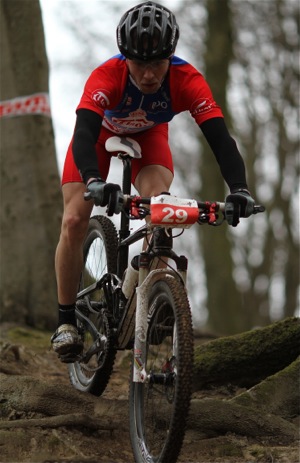Dehydration Shortens Time to Onset of Muscle Cramps
Exercise-induced muscle cramps are common among cyclists in the end of hard races. Some riders seem to have more frequent episodes of muscle cramps than others, but most cyclists have experienced the phenomena. Your performance will be lowered if you have leg cramps, so there is good reason to learn how to avoid such.
 It is often written that hydration with water and different electrolytes may protect riders from muscle cramps, since dehydration and electrolyte imbalance is very close related to these involuntary, painful muscle contractions. One of the potential risks is exercising in hot environment because of dehydration and massive loss of sodium, potassium, magnesium and other electrolytes. When this water loss is recovered with plain water, there will be a net loss of electrolytes. In old days hard working people who worked in mines died because of an excessive water intake that diluted the concentration of electrolytes. This was called ”˜Minors Cramp‘.
It is often written that hydration with water and different electrolytes may protect riders from muscle cramps, since dehydration and electrolyte imbalance is very close related to these involuntary, painful muscle contractions. One of the potential risks is exercising in hot environment because of dehydration and massive loss of sodium, potassium, magnesium and other electrolytes. When this water loss is recovered with plain water, there will be a net loss of electrolytes. In old days hard working people who worked in mines died because of an excessive water intake that diluted the concentration of electrolytes. This was called ”˜Minors Cramp‘.
Scientists from the University of North Carolina have published an article in Journal of athletic training, June 2005: Influence of Hydration and Electrolyte Supplementation on Incidence and Time to Onset of Exercise-Associated Muscle Cramps.
In this study 13 men with a history of exercise-induced muscle cramps performed two tests that were made to provoke muscle cramps in the calves. One test was done with supplementation of water, carbohydrates and sodium, while the other test was done without any supplementation. The findings were that 9 people developed muscle cramps in the hydration/supplementation trial and 7 people did in the dehydration trial.
These findings do not indicate that hydration and supplementation with carbohydrates and electrolytes protect against muscle cramps. It tells us that there are other factors implicated in development of exercise-induced muscle cramps. However, in the hydration/supplementation trial, the time to onset of muscle cramps were prolonged (36.8 minutes completed before onset, compared to only 14.6 minutes in the dehydration trial.)
In my opinion, the study should have included a trial with plain water only. This should be done to see if it was the water or the supplementation that prolonged the time to onset of muscle cramps.
Dehydration Shortens Time to Onset of Muscle Cramps Read More »

